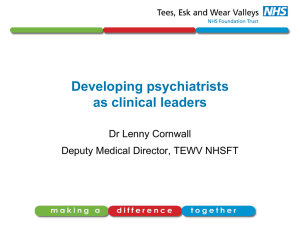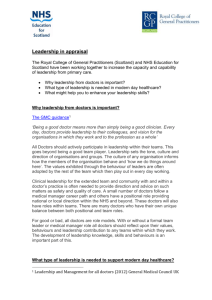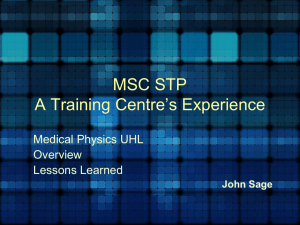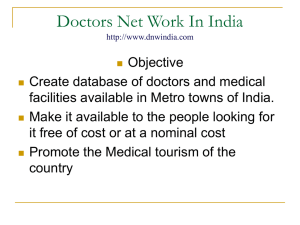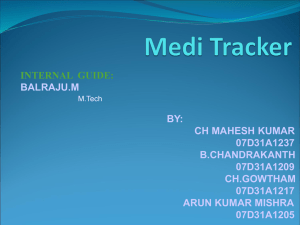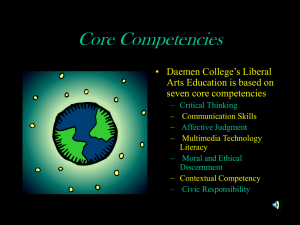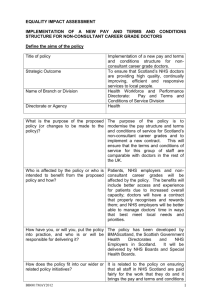The Medical Leadership Curriculum
advertisement
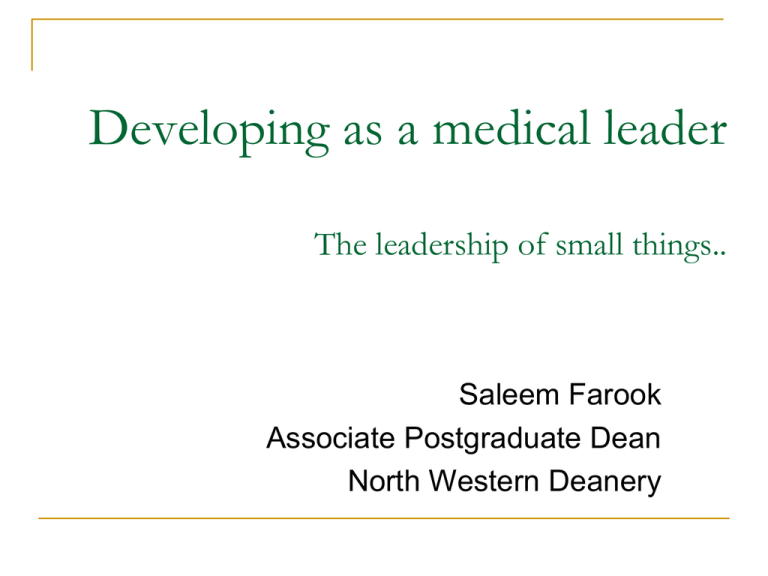
Developing as a medical leader The leadership of small things.. Saleem Farook Associate Postgraduate Dean North Western Deanery Aims Why ? – the importance of developing as medical leaders What – we mean when we say medical leadership? How we should do it? Background.. The times we live in... Services at full stretch Limited resources High expectations from the public Climate of continual change Service reconfigurations NHS reforms The Charismatic leaders Charismatic leaders “Charisma is a tricky thing. .... Used wisely, it's a blessing; indulged, it can be a curse...Charismatic visionaries lead people ahead - and sometimes astray.” Fortune, January 15, 1996 Defining leadership.. Multitude of definitions Various qualities Different styles of leadership Vast literature Shared (diffused) leadership Shared vision and a common cause Organisational effectiveness Team leadership Personal sense of achievement High readiness for change High concern & engagement What is happening in the NHS? Growing evidence of link between medical engagement and organisational performance Hamilton, J. et al. Engaging Doctors: can doctors influence organisational performance? NHS Institute for innovation and improvement. 2008 Aspiring to excellence “..greater attention is paid to management and leadership skills, regardless of the specialism. An acknowledgement of the leadership role of medicine...” - Prof. John. Tooke, 2008, General Medical Council “ all practising doctors are responsible for use of resources... Doctors have responsibility to their patients, employers.. ..This means doctors are both managers and are managed.” Management for doctors, 2006 Leadership or Management? Leadership or Management? Manager Leader Administers Maintains Focuses on systems Relies on control Does things right Innovates Develops Focuses on people Inspires trust Does the right thing Hollingsworth, M. J. The British Journal of Administrative Management. 1999 Leadership or Management? “..management and leadership are being seen as inextricably linked. It is one thing for a leader to propound a grand vision, but this is redundant unless the vision is managed so it becomes real achievement” Dearlove, D. Reinventing leadership. 2001 But where do we start?... Medical Leadership Competency Framework AOMRC & NHS Institute for innovation and improvement. Enhancing engagement in medical leadership project. 2008. Medical Leadership Competency Framework – Personal Qualities Self awareness Self management Self development Acting with integrity Medical Leadership Competency Framework – Working with Others Developing networks Building relationships Encouraging contributions Working with teams Medical Leadership Competency Framework – Managing Services Planning Managing resources Managing people Managing performance Medical Leadership Competency Framework – Improving Services Ensuring patient safety Critically evaluating Encouraging improvement and innovation Facilitating transformation Medical Leadership Competency Framework – Setting Direction Identifying the context for change Applying knowledge Making decisions Evaluating Impact Medical Leadership Competency Framework Undergraduate Postgraduate Post-Specialist Certification A framework for leadership training in medicine Acknowledgement that ALL doctors require management and leadership competences to be effective practitioners; SOME take on service leadership roles AOMRC & NHS Institute for innovation and improvement. Enhancing engagement in medical leadership project. 2008. This GMC guidance comes into effect on 12 March 2012.. So how do we develop as medical leaders?... Is attending a training course enough? If not, why not? Back to basics.. The Kolb’s learning cycle Concrete Experience Active Experimentation Reflective Observation Abstract Conceptualisation Back to basics.. A simplified Kolb’s learning cycle Carr, S Postgrad Med J 2003;79:622-626 Copyright ©2003 BMJ Publishing Group Ltd. Back to basics.. An even more simplified Kolb’s learning cycle DO PLAN STUDY/ REFLECT ACT Developing as a leader - Do Utilise opportunities at the clinical workplace But...Is simply “doing something” enough? Developing as a leader– Reflect/ Study Reflective PRACTICE Knowledge of what is required Learning the theory Attending a course/ conference Developing as a leader - Plan Linking with reflective practice/ study sessions Setting SMART objectives Incorporating learning needs into Personal Development Plans Developing as a leader - Act Deliberate Practice Evidence of practice through portfolio Assessment and appraisal Seek and receive feedback The importance of feedback Perform Feedback Study & Plan Reflect Feedback drives learning Assessment drives learning Improving Assessment. AoMRC. 2009. How could leadership skills be acquired in clinical practice? It is the small things that matter.. Leadership Activities – examples.. Clinical Audit Clinical Care Pathway Working with colleagues Clinical incident analysis Implementing recommendations to improve service Get involved in feedback and learning Managing clinical risk and patient safety programmes Leadership Activities Often it is the small things that make a big difference... Often it is the smaller skills that achieve the big things... Summary – Developing as a medical leader Awareness of the need Knowledge of the framework Utilising opportunities that exist within clinical practice One small step…

